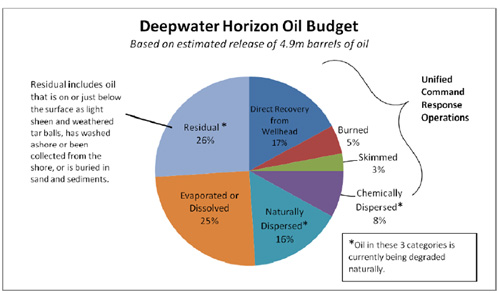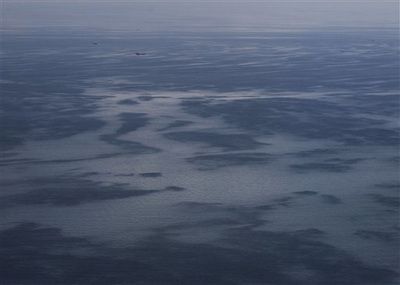Just one question: Where’s the oil?
News organizations are gleefully reporting today that most of the oil that we saw gushing out of that broken well for nearly three months has “disappeared.” It’s petroleum magic.
The rosy assessment comes from a science report issued today by the Department of the Interior. It said:
In summary, it is estimated that burning, skimming and direct recovery from the wellhead removed one quarter (25%) of the oil released from the wellhead. One quarter (25%) of the total oil naturally evaporated or dissolved, and just less than one quarter (24%) was dispersed (either naturally or as a result of operations) as microscopic droplets into Gulf waters. The residual amount — just over one quarter (26%) — is either on or just below the surface as light sheen and weathered tar balls, has washed ashore or been collected from the shore, or is buried in sand and sediments. Oil in the residual and dispersed categories is in the process of being degraded. The report below describes each of these categories and calculations. These estimates will continue to be refined as additional information becomes available.

NOAA Administrator Jane Lubchenco says there’s no oil on the sea floor, either.
Rice University Chemical Engineering Professor Dr. George Hirasaki said, “It doesn’t surprise me because I understand the effect of aging on crude oil.” He told KTRK TV in Houston that the Gulf is prime habitat for oil-eating creatures. “It’s relatively light oil and the Gulf of Mexico is much warmer than Alaskan regions, so you get a lot of biodegradation,” he said.
So after three months of hand-wringing over the environmental disaster now and in the future, we’re being told “never mind”?
Still, if you use the government’s calculations, 51.5 million gallons of oil is still below the surface. It hasn’t disappeared. It hasn’t disperesed. And it hasn’t been eaten up by tiny oil-loving creatures. That’s still nearly five times the oil spilled in the Exxon Valdez disaster in Alaska, the previous record-holder for oil disasters in the U.S.
It’ll be interesting to hear Science Friday on MPR on Friday to find out why so many predictions and assessments for the spill’s effects were so wrong.

